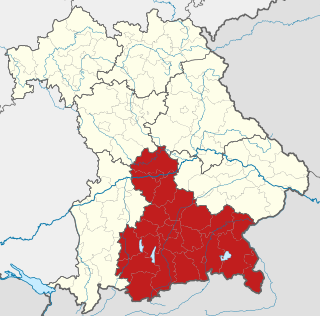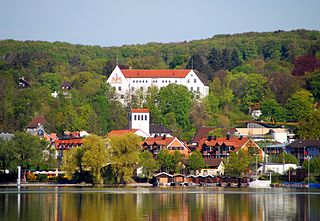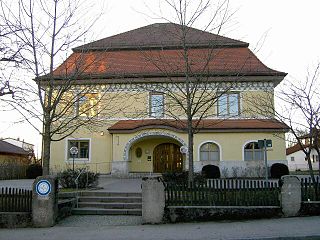
The House of Wittelsbach is a former Bavarian dynasty, with branches that have ruled over territories including the Electorate of Bavaria, the Electoral Palatinate, the Electorate of Cologne, Holland, Zeeland, Sweden, Denmark, Norway, Hungary, Bohemia, and Greece. Their ancestral lands of Bavaria and the Palatinate were prince-electorates, and the family had three of its members elected emperors and kings of the Holy Roman Empire. They ruled over the Kingdom of Bavaria which was created in 1805 and continued to exist until 1918.

Upper Bavaria is one of the seven administrative regions of Bavaria, Germany.
Bad Tölz-Wolfratshausen is a Landkreis (district) in Bavaria, Germany. It is bounded by Austria and the districts of Garmisch-Partenkirchen, Weilheim-Schongau, Starnberg, Munich and Miesbach.

Duchess Sophie Charlotte Augustine in Bavaria was a granddaughter-in-law of King Louis Philippe of France, the favourite sister of Empress Elisabeth of Austria and fiancée of King Ludwig II of Bavaria.

Starnberg is a town in Bavaria, Germany, some 30 kilometres (19 mi) southwest of Munich. It is at the north end of Lake Starnberg, in the heart of the "Five Lakes Country", and serves as capital of the district of Starnberg. Recording a disposable per-capita income of €26,120 in 2007, Starnberg regained its status as the wealthiest town in Germany.

Lake Starnberg, or Starnberger See ) — called Lake Würm or Würmsee until 1962 — is Germany's second-largest body of fresh water, having great depth, and fifth-largest lake by area. It and its surroundings lie in three different Bavarian districts, or Landkreise. The lake is property of the state and accordingly managed by the Bavarian Administration of State-Owned Palaces, Gardens and Lakes.
Duke in Bavaria was a title used among others since 1506, when primogeniture was established, by all members of the House of Wittelsbach, with the exception of the Duke of Bavaria which began to be a unique position. So reads for instance the full title of the late 16th century's Charles I, Count Palatine of Zweibrücken-Birkenfeld and patriarch of the House of Palatinate-Birkenfeld: "Count Palatine by Rhine, Duke in Bavaria, Count to Veldenz and Sponheim". The title grew in importance as Wilhelm, Count Palatine of Zweibrücken-Birkenfeld-Gelnhausen began to use it, in the early 19th century, as his primary title – Duke Wilhelm in Bavaria. This choice has also had effect for his descendants.

Maria Sophie Amalie, Duchess in Bavaria was the last Queen of the Two Sicilies as the wife of Francis II of the Two Sicilies. She was one of the ten children of Maximilian Joseph, Duke in Bavaria and Princess Ludovika of Bavaria. She was born as Duchess Maria Sophia in Bavaria. She was the younger sister of the better-known Elisabeth of Bavaria ("Sisi") who married Emperor Franz Joseph I of Austria.

Schloss Ringberg is located in the Bavarian Alps, 50 km south of Munich, on a foothill overlooking the Tegernsee. Not open to the general public, it is a property of the Max Planck Society and used for conferences.

Laxenburg castles are imperial palaces and castles outside Vienna, in the town of Laxenburg owned in equal parts by Vienna and Lower Austria. The castles became a Habsburg possession in 1333 and formerly served as a summer retreat, along with Schönbrunn palace, for the imperial Habsburg dynasty. Blauer Hof Palace was the birthplace of some members of the royal family, including Crown Prince Rudolf. Another castle nearby is named Franzensburg castle.

Feldafing is a municipality in Starnberg district, Bavaria, Germany, and is located on the west shore of Lake Starnberg, southwest of Munich.

Pöcking is a municipality in the district of Starnberg in Bavaria, Germany. It is best known for being the location of Duchess Elisabeth in Bavaria's childhood summer home, Possenhofen Castle.

Duke Maximilian Joseph in Bavaria, known informally as Max in Bayern, was a member of a junior branch of the royal House of Wittelsbach who were Kings of Bavaria, and a promoter of Bavarian folk-music. He is most famous today as the father of Empress Elisabeth of Austria ("Sisi") and great-grandfather of King Leopold III of Belgium.

Sissi is a 1955 Austrian historical romance film written and directed by Ernst Marischka and starring Romy Schneider, Karlheinz Böhm, Magda Schneider, Uta Franz, Gustav Knuth, Josef Meinrad, Vilma Degischer and Peter Weck. Sissi is the first installment in the trilogy of films about Empress Elisabeth of Austria, who was known to her family as "Sisi". It was followed by The Young Empress and Fateful Years of an Empress.

Karl Theodor, Duke in Bavaria, was a member of the House of Wittelsbach and a professional oculist. He was the favorite brother of Empress Elisabeth of Austria, and the father of Queen Elisabeth of the Belgians.

Duchess Helene in Bavaria, nicknamed Néné, was the Hereditary Princess of Thurn and Taxis as the wife of Maximilian Anton Lamoral. She was a Duchess in Bavaria by birth as the daughter of Duke Maximilian Joseph and Princess Ludovika. She was temporarily the head of the Thurn and Taxis family.

Archduchess Mathilde Marie Adelgunde Alexandra of Austria was a member of the House of Habsburg-Lorraine as the daughter of Archduke Albert, Duke of Teschen. She was intended to become the Queen of Italy as the wife of King Umberto I, but her early death prevented the marriage.

Berg Palace is a manor house situated on the east bank of Lake Starnberg in the village of Berg in Upper Bavaria, Germany. The site became widely known as the last residence of King Ludwig II of Bavaria and location of his disputed death. Today, it serves as residence of Franz, Duke of Bavaria, head of the house of Wittelsbach.

Ludwig II, also called the Swan King or the Fairy Tale King, was King of Bavaria from 1864 until his death in 1886. He also held the titles of Count Palatine of the Rhine, Duke of Bavaria, Duke of Franconia, and Duke in Swabia. Outside Germany, he is at times called "the Mad King" or Mad King Ludwig.

The Empress is a German historical drama television series based on the life of Empress Elisabeth of Austria, starring Devrim Lingnau in the title role, and Philip Froissant as Emperor Franz Joseph. It was released on Netflix on 29 September 2022. It was Netflix's second-most watched series worldwide for two weeks and the seventh most popular non-English series of 2022, with over 150 million hours streamed. On 8 November 2022, Netflix renewed it for a second season. Netflix also commissioned a companion novel, The Empress: A Novel, by Gigi Griffis, which was published two days before the series premiered on the streaming service.The second season is set to premiere on November 22, 2024.



















